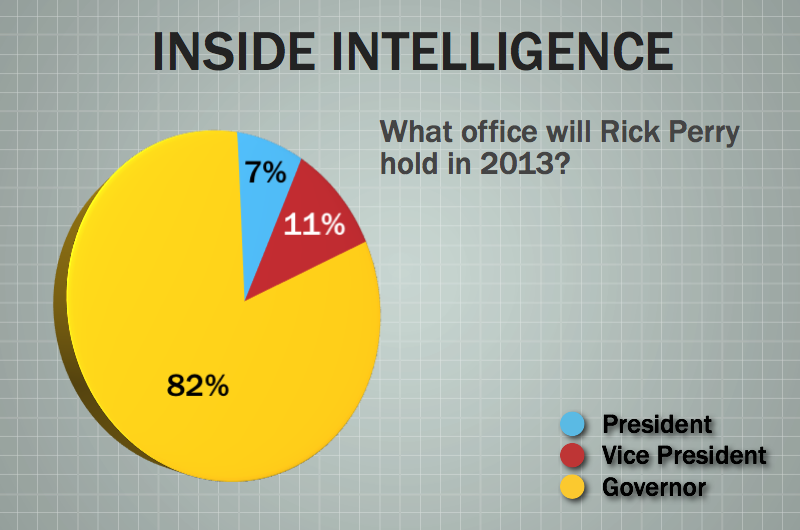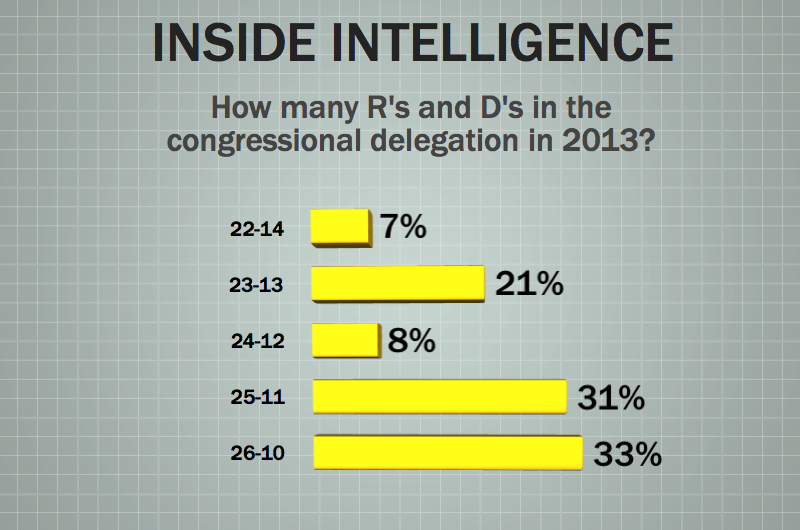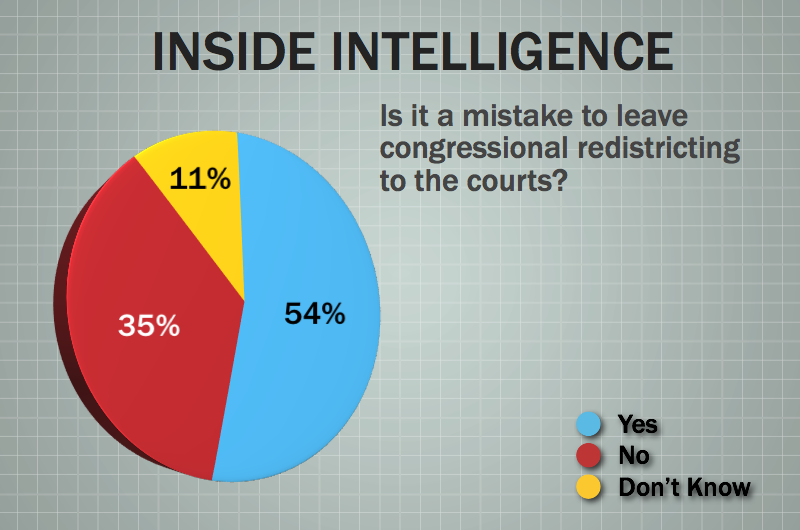It simultaneously looks as though they will finish on time and as though they'll come to pieces, forcing a special session.
Everyone is pooped. The session is almost over. Everything is more or less done, except for the budget — the only thing that has to pass.
Everything in the budget is done, except for school finance. That particular topic has been busting up the last days of legislative sessions for decades. It's the issue most likely to prompt a special session at this point, though there's also been overtime talk about congressional redistricting, about the Texas Windstorm Insurance Association, and about sanctuary cities.
School finance, a critical part of the budget, would certainly prompt Gov. Rick Perry to call lawmakers back to Austin. The others aren't necessarily good bets, but could get tacked onto a special session called for something else.
School district printouts might well be the culprits. The House voted out the budget two months ago without members seeing how the cuts in public schools would affect individual school districts and, by extension, their own political fortunes. Voters might be just fine with the thrift — nobody really knows — but the possibility that they won't be okay has everyone on edge. Now that there are printouts, it's a harder vote for lawmakers to cast. They can't be sure of the reactions, but the amount of damage is clear. Now, lawmakers are figuring out where the cuts fall (keep reading) and which school districts get what from the state.
Sometime in July, the local districts will settle on their budget numbers and their tax rates and so on. If there's pain there, who gets the blame? School board members who actually raised taxes and or made cuts? Local state legislators who put the school districts in that position. In the alternative, who gets the credit if voters are happy with the results?
The thing at the end — there's always a thing at the end — might turn out to be the "Don't Touch My Junk" bill that died (apparently) in the Senate this week. Sen. Dan Patrick, R-Houston, thought he had a surefire populist issue and found he couldn't get the votes to bring it up. He blamed Lt. Gov. David Dewhurst, flaring up in the kind of sudden-and-yet-on-message way that sometimes begins an election campaign. "Someone who will not stand up to the federal government, you have to ask yourself, is that the kind of person we need in the U.S. Senate?" Patrick asked.
We'll find out as early as this week whether he wants to join the field of Republicans running for the U.S. Senate. Dewhurst is the frontrunner in that pack at the moment. Maybe government groping at airports will be a campaign theme.
Cramming for Finals
Negotiators in both chambers agreed to a budget Thursday morning. But it’s a missing one piece: school finance.
The House and Senate are still haggling over what the plan to distribute the $4 billion reduction in state funding to public education should look like. And the death of a key education fiscal matters bill on the House floor Monday ensured that any changes to school finance formulas will happen in conference committee over SB 1811, the legislation generating the non-tax revenue in the form of deferrals and accelerated tax payments that's essential to balancing the budget.
House members favor a short-term solution that would keep current law in place and enact the same percentage cut — the most recent figure puts that at 6 percent — to all districts across the board. That would happen through tweaking the process known under current law as “proration” and leaving any significant policy changes addressing the target revenue system or the structural deficit to the 83rd Legislature.
"I think we will park school finance where it is for a couple of years and come back," said Rep. Jimmie Don Aycock, R-Killeen. "I hope that most of you will pledge to study up some about school finance between now and when we come back."
The problem with any one-size-fits-all approach, according to the Equity Center, a research and lobbying organization that advocates on behalf of poorer districts, is that it puts most of the hurt on districts that have the least. A 6 percent reduction could barely make a dent in the budget of a wealthy district while forcing serious restructuring in one that is already cash-strapped.
That’s why the Senate isn’t ready to give up on more long-term adjustments to school funding. What to do with the target revenue, the system that, because of the promise the Legislature made to districts in 2006 when it reduced property tax rates, means some districts aren’t funded on a cost-based model but rather what they received per student in property tax rates that year.
A proposal from Sen. Florence Shapiro, R-Plano, distributes the cuts on a sliding scale across districts, making deeper reductions to those that have benefited most from the target revenue system, and it makes a commitment to eliminating the funding mechanism completely by 2017.
Those in charge of the talks they will come out of negotiations with a hybrid model. A possibility: distributing $2 billion of the cuts through proration the first year, then taking $2 billion from target revenue reserves in the second. Whether they can reach a compromise palatable to both bodies depends on how much senators — particularly Sens. Robert Duncan, R- Lubbock, and Bob Deuell, R-Greenville, two SB 1811 conferees — are willing to budge on target revenue.
Still Seeking Sanctuary
With hours ticking away until sine die, the legislation that would prohibit local entities from enacting policies that prevent local law enforcement from inquiring about immigration status of persons arrested or detained is on life support in the Senate.
At first glance, House Bill 12 by Rep. Burt Solomons, R-Carrollton, appears dead. It sailed out of the House on a party-line vote but failed to make to the Senate floor. Senate sponsor Tommy Williams, R-The Woodlands, couldn’t convince two of the 12 Democrats to support the measure and suspend the two-thirds rule. And Williams appeared to kill his own bill at an earlier stage when he erased it in favor of a committee substitute dealing with border and homeland security. Two days later, Williams successfully revived the bill, reconsidering the substitute and reverting back to the former language.
Then he couldn't get the votes to bring it up. There is still talk that the legislation could resurface in a conference committee report on something else. That appears to be the last chance for the bill, one of the governor's six emergency issues.
Seven "Distractions"
For months, the higher education community has been consumed by a debate about a specific set of proposed reforms, known as “the seven breakthrough solutions.” They were written by Austin businessman and Acton School of Business founder Jeff Sandefer. Along with Gov. Rick Perry and the Texas Public Policy Foundation, a conservative think tank, Sandefer, who is a Perry donor and a TPPF board member, has encouraged regents to implement his proposals since 2008.
But now, it appears that the “breakthrough solutions” might be on the verge of reform themselves. At a meeting of the Texas A&M University System Board of Regents, a group that has been the most pro-active about implementing the reforms, chairman Richard Box appeared to shrug off the proposals entirely. He said that he understood the “seven solutions” to be “simply suggestions” with which to frame a conversation about how to improve boost productivity at universities as financial resources became more constrained. “But they have also become a distraction from an important conversation,” he said, adding that it was time to “move on.”
After the meeting, he went a step further, saying that the “seven solutions” have become “a pejorative” and that it's time to “change the conversation.”
TPPF President and CEO Brooke Rollins’ response indicated that the reforms might be revisable in the wake of significant backlash from faculty and alumni of the state’s flagship institutions, the University of Texas at Austin, and Texas A&M University-College Station.
"As our '7 Breakthrough Solutions' have been further studied and implemented, we have gained insights that are causing us to refine those solutions and consider new approaches,” she wrote in an email. “We welcome additional ideas about how to improve higher education and commit ourselves to continuing an open, public dialogue on this issue."
Back in April, Perry spokesman Mark Miner said the governor was not committed to the specific reforms. “There are bits and pieces of all of them that the governor has talked about in the past, but to say that they are packaged and these are the seven points the governor is pushing is not accurate,” Miner said.
Faculty members at A&M were distrustful that the reforms were indeed being shrugged off or changed. John Edens, a professor of psychology said it was difficult to tell if policymakers were “saying one thing and doing another or if there has been a change in course.”
The Week in the Rearview Mirror
Eyes have turned once again to Texas and tongues are wagging about the possibility of a Rick Perry presidential bid. After former Arkansas Gov. Mike Huckabee and Indiana Gov. Mitch Daniels announced they wouldn’t be running, speculation mounted about a potential Perry candidacy. Although the governor continues to deny that he is in the hunt, talk show host Rush Limbaugh found the subject compelling enough to spend 20 minutes on his show extolling Perry’s virtues and bemoaning the current state of the Republican field. Other pundits wonder if Perry’s playing it cool and waiting to be summoned as party insiders grow more dissatisfied with their choices.
State budget woes aren’t the only problem plaguing Texas cities. Millions of dollars in funds that were available to cities last year under the Urban Areas Security Initiative have been cut from the federal budget, affecting Austin, El Paso and San Antonio. The three cities received more than $14.5 million under the anti-terror program in the last budget, but funds will now be restricted to the cities highest at risk as identified by the Department of Homeland Security.
Texas’ election calendar drew attention this week as lawmakers attempted to change primary dates to give overseas and military personnel more time to vote. Given the choice between moving the primary to April or moving the filing deadline up a month, lawmakers chose the latter, leaving the Texas primary in March. Moving the filing deadline to December will require a Texas constitutional amendment, but many political observers feel it’s important to keep the primary as early in the year as possible to keep Texas from having no influence on presidential elections.
A nonprofit research group has stirred controversy by reporting that the majority of students at the University of Texas are taught by only about 20 percent of the faculty and that if the rest of the faculty taught more classes, tuition could be reduced substantially. The study drew criticism from UT’s president for using raw data, but the group’s director defended the report. Another study took aim at Texas A&M, reporting that based on comparisons between money it spent on research and research papers published, it was the second-least-productive campus in the nation.
An analysis of federal employment data revealed that Texas has created more jobs in the last 10 years than any other state: 732,800 new jobs since April 2001. No other state came close, and only 19 states plus the District of Columbia showed net growth. Topping the charts in job loss were California and Michigan, at 623,700 and 619,200 respectively. The strength of Texas’ numbers was attributed to a stronger real estate market.
As abortion sonogram legislation, one of Gov. Rick Perry’s declared emergency items, arrived at the governor’s desk for his signature, an abortion-rights group prepared to challenge the legislation. The Center for Reproductive Rights in New York is preparing to file suit against the law, which is set to take effect Sept. 1.
With a statewide drought lingering, another massive wildfire ignited in West Texas, threatening the city of Midland. Residents were asked to evacuate homes and businesses as the grassfire made a rapid advance toward the city limits from its starting point west of town. Firefighters were able to control the fire after it burned more than 4,000 acres, but there were no homes lost and no serious injuries reported — a major victory in this record season for wildfires.






